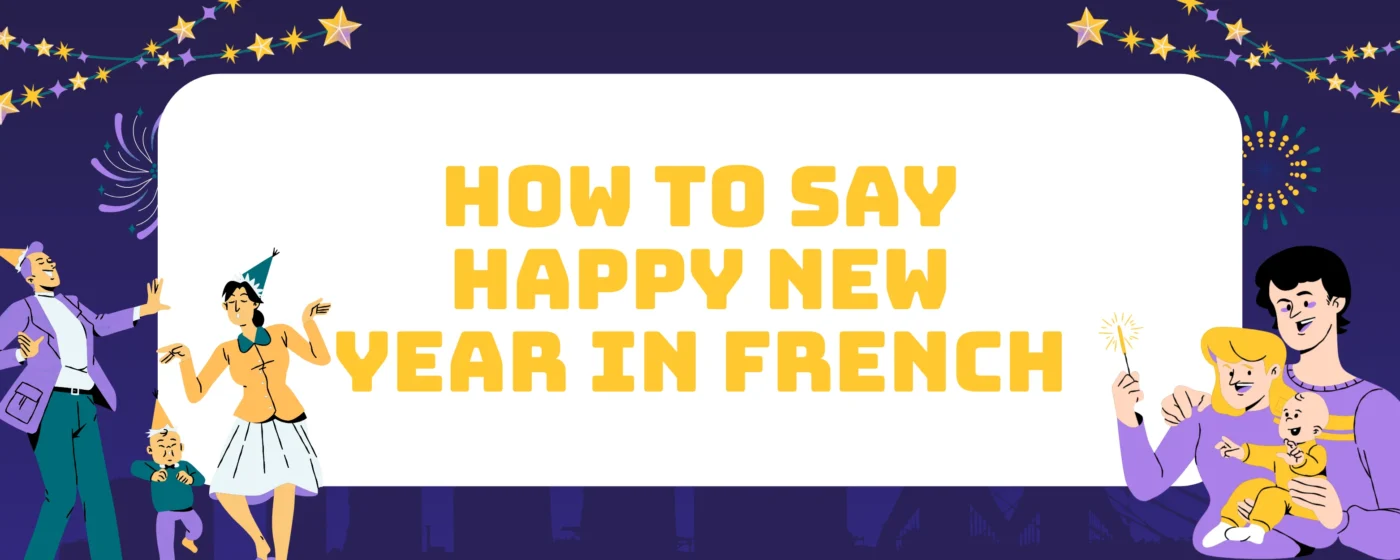So you want to truly connect with French speakers and understand their culture? Well, then you need to forget just memorising those stale vocabulary lists by heart and begin learning real, authentic French phrases. That’s where the magic happens! Having such phrases and expressions in your arsenal will boost your confidence, make conversations flow smoothly, and help you build authentic connections with the locals. Es-tu prêt to learn 10 different ways to say “Good Luck” in French? Well, allez-y!
Key Takeaways
- Learn the word in different ways to say “Good luck” and also know the formal and informal ways to say Good luck.
- Know the words which are theatre tricks, such as Merde (shit) means “break a leg”—wishing direct luck brings bad juju!
- Learn the words for bon courage, cheers, tough stuff like moves or tests, more “stay strong” than pure luck.
- Know the words that use superstitions, such as Je touche du bois (knock on wood) or je croise les doigts (fingers crossed) ward off jinxes.
- Learn and practice different Formal or formulaic words, such as Meilleurs vœux, bonne route (safe travels), bonne continuation (all the best ahead).
How to Say “Good Luck” in French
1. Bonne Chance
Pronunciation: bon shans
Usage: You must’ve come across your language teachers often saying “Bonne Chance” before you go write an important exam. In the French language, “chance” means luck, and “bonne chance” is the universally accepted way to say “good luck” to someone.
It is literally translated as “good luck” and is the most common French expression for wishing luck. It’s the go-to English expression and English equivalent for wishing someone well. It’s an extremely versatile phrase, useful for both formal and informal situations.
After wishing luck, you can reassure someone by saying « ça va marcher » (it will work out). There are other phrases for wishing luck in French, depending on the context.
Example: Bonne chance pour ton entretien demain! (Good luck for your interview tomorrow!)
2. Merde
Pronunciation: mehrd
Usage: While “merde” is generally considered vulgar, it has an interesting exception! The word merde literally means “horse excrement.” Usually, “merde” translates to “shit” but it is also considered a traditional good luck charm among theatre folk. This tradition originates from a bygone time when theater-goers arrived by horse-drawn carriages.
What’s the connection? Well, a full house meant lots of horses, and therefore, lots of horse excrement – a sign of a successful show. Some believe that directly wishing good luck can bring bad luck, so “merde” is used as an alternative. So, wishing someone “merde” before a performance is a quirky way of hoping for a packed house and great success!
Example: Tu joues dans la pièce ce soir ? Merde alors! (You’re performing in the play tonight? Break a leg!)
3. Bon Courage
Pronunciation: bo koo-razh
Usage: “Bon courage” simply translated means “good luck”. However, it’s not simply a good luck expression! It’s much more than that – it’s used to express encouragement and support, especially when luck plays a role in the outcome. It’s primarily used in situations that are challenging, like giving an exam or going for an interview.
Example: Bon courage pour ton déménagement ce week-end. (Good luck with your move this weekend.)
4. Meilleurs Vœux
Pronunciation: may-yer voo
Usage: “Meilleurs Vœux” is a versatile French expression that translates to “Best Wishes” in English. It’s basically used for expressing good wishes, especially during festive occasions (like the New Year) or when someone reaches a significant milestone (like a birthday or graduation). It is especially used for wishing luck and best wishes for a new life or major change.
Example: Meilleurs vœux pour cette nouvelle année pleine de bonheur ! (Best wishes for this new year full of happiness!)
5. Je Touche du Bois
Pronunciation: zhuh toosh doo bwah
Usage: You know how you touch a piece of wood when you want to prevent bad luck? Well, “Knock on wood” is exactly what “Je Touche du Bois” translates to. This phrase is believed to be used to ward off bad luck after mentioning something positive that you fear might jinx it.
Example: Je n’ai jamais été malade cette année… je touche du bois ! (I haven’t been sick this year… knock on wood!)
6. Je Croise les Doigts
Pronunciation: zhuh krwahz lay dwah
Usage: “Je croise les doigts” is another French expression for wishing luck, and is the French equivalent of the gesture of crossing one’s fingers for good luck. It literally translates to “I cross my fingers”. Like many gestures of luck, this expression also has a superstitious element to it.
Simply put, it’s a way of acknowledging the uncertainty of a situation and hoping to influence the outcome, even if only in a small way. It’s a commonly used expression, with varied meanings: it can be used to express hope, anticipation, and even a desire for a positive outcome.
What’s better is that it can be used in both casual as well as formal settings. The English equivalent is “fingers crossed.”
Example: Je croise les doigts pour que tu réussisses ton examen. (Fingers crossed that you pass your exam.)
7. Que la chance soit avec toi!
Pronunciation: kuh la shahnss swah ah-vek twah
Usage: “Que la chance soit avec toi!” is also a crucial expression to know if you’re looking to enrich your French vocabulary in terms of different ways to say “Good luck”! It translates to “May luck be with you!”
This is a more dramatic and slightly less common way to say “good luck”, often used in a playful or slightly theatrical manner, reminiscent of a bygone time, similar to the English phrase. It is a more theatrical way of wishing luck.
Example: Tu vas tenter le grand saut ? Que la chance soit avec toi! (You’re taking the big leap? May luck be with you!)
8. Bonne Route
Pronunciation: bon root
Usage: “Bonne route” is literally translated as “Have a good trip/ Safe travels”. It’s a warm and sincere way to wish a safe trip/ journey to someone. Be it a short road trip, a long inter-country vacation or even a cruise; this expression is used to convey good luck and a wish for safety!
Example: Tu pars déjà ? Bonne route et à bientôt! (You’re leaving already? Safe travels and see you soon!)
9. Je Vous Souhaite Bonne Chance
Pronunciation: zhuh voo soo-wet bon shans
Usage: “Je Vous Souhaite Bonne Chance” is a polite and formal way of wishing luck! It’s mostly used in situations where you desire to express good wishes to someone in a respectful manner. It’s considered more formal and professionally sound than the usual “Bonne chance”, and is often wished in professional settings.
Example: Je vous souhaite bonne chance pour votre présentation devant le comité. (I wish you good luck for your presentation in front of the committee.)
10. Bonne Continuation
Pronunciation: bon kon-tee-new-a-see-ohn
Usage: “Bonne continuation” is a French expression that literally translates to “Have a good continuation”. This is a commonly used phrase, often used to wish someone continued success and good luck in their future endeavours and efforts. It not only implies good wishes or luck for a single event, but an encouragement to keep going and succeeding in the future.
Ever heard your French professors say “Bonne continuation” to you after you score well on an exam? Well now you know why they say it!
Example: C’était un plaisir de travailler avec vous. Bonne continuation! (It was a pleasure working with you. All the best moving forward!)
Stop Guessing, Start Speaking!
With our expert tutors, you’ll master the words you need to speak French confidently!
French Superstitions Around Good Luck
French culture is rich in unique superstitions when it comes to wishing good luck. A popular expression is “je touche du bois” (I touch wood), used much like “knock on wood” in English. The idea is to ward off bad luck after speaking about something positive.
This act is deeply rooted in French culture as a way to prevent misfortune. Another well-known superstition involves the number 13, especially when it falls on a Friday. On Friday the 13th, many French people become extra cautious and may avoid major decisions, using phrases like “je touche du bois” or relying on lucky charms for comfort.
Lucky charms hold a special place in French traditions. Objects like the four-leaf clover and an upside-down horseshoe hung above a door are considered symbols of good fortune. These are often given as gifts when someone starts a new job or moves into a new home.
These items are believed to attract success and happiness. Interestingly, there’s also a humorous belief that stepping in dog droppings with your left foot brings good luck though it’s hardly a preferred method!
Sometimes, directly saying “good luck” is avoided due to fear of bad luck. Instead, phrases like “merde” before performances, or symbolic gestures, are used. Understanding these customs shows appreciation for French culture and helps build deeper connections with French speakers, especially during important life moments.
Improve your workplace communication by using the right Business French Vocabulary in meetings, emails, and client interactions.
How to Respond to Good Luck Wishes in French?
When someone wishes you good luck in French, it’s not only polite but also a great way to build rapport if you know how to respond appropriately. The simplest and most universal response is “merci” (thank you), which works in almost all situations, whether formal or informal. If you want to sound a bit more formal, especially in professional settings, you can say “je vous remercie” (I thank you), which shows extra appreciation.
In more casual or friendly contexts, you might hear or use “merci, je vais en avoir besoin” (thanks, I’ll need it), which adds a touch of humility and humor, acknowledging that a bit of luck would be welcome. Another common response is “je l’espère” (I hope so), which expresses your own hope for a positive outcome and keeps the conversation light.
If you want to return the good luck wish, simply say “à toi aussi” (to you too) or “à vous aussi” in formal situations. This is a friendly way to reciprocate and keep the good vibes going. In French culture, responding to good luck wishes, whether for a new job, an important exam, or any big event is seen as a sign of good manners and helps foster positive relationships. So next time someone wishes you “bonne chance” or “bon courage,” you’ll know exactly how to respond and keep the luck in French flowing!
Enhance your vocabulary with the Top 7 Ways to Say Congratulations in French and celebrate moments the French way.
Frequently Asked Questions
1. Is there a French equivalent of “break a leg”?
Ans: While French doesn’t have a direct equivalent to “break a leg”, “Merde” is probably the closest equivalent. However, it’s used in the context of theater and performance. This tradition is believed to have originated in the theater world, where a lot of “merde” (horse manure) outside the theater meant that many people arrived by carriage, indicating a large audience and thus a successful show!
2. What does “Porter chance” mean?
Ans: This phrase literally means “to bring good luck”, referring to a person or object believed to be lucky.Top 10 Ways to Say “Good Luck” in French





